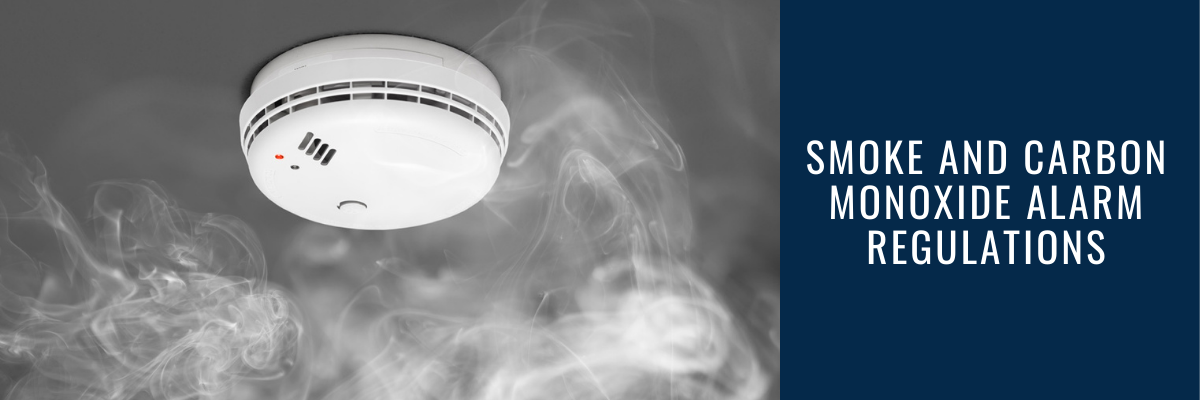We have had a couple of mentions from perspective tenants about smoke alarms and carbon monoxide alarms. So I thought we would good to write a post on what the regulations are for landlords.
As a landlord, you have many legal responsibilities and one of them is to protect your tenants from the risks of fire and carbon monoxide. In taking care of your tenants, you are also protecting your property from severe damage.
One thing to be aware of is that fire regulations for rental properties can change at any time, and ignorance is no excuse. We would recommend that you should keep up to date of any new laws which apply to your property or you could find yourself facing a hefty fine or even a custodial sentence. As the local authorities now keep the fine they are on the hunt for non-compliant landlords.
What are the current landlord smoke alarm requirements?
There are different regulations depending on the sort of property you own. If you rent the whole house to a family known as single lets or you rent the house to multiple people known as house of multiple occupancy (HMO)
Regulation for single lets
The current regulations in England require private landlords to install at least one smoke alarm on each storey of a property in which there is a room used as living accommodation.
The regulations outline the bare minimum you should do, but the more alarms you install, ultimately the safer your property will be for your tenants. Additional alarms might provide occupants with a few vital extra seconds to escape, which could make all the difference.
The smoke alarms that you install should be heard throughout the property and positioned to maximise their potential to do their job in detecting smoke. Majority of the time this would be in places such as a hallway or landing.
Part of the regulation which not many know about is that you must ensure that the alarms are in proper working order at the beginning of each new tenancy. This must also be recorded, these are usually tested in the inventory. However, you are not responsible for testing the alarms during the tenancy. What you should do is remind your tenants that they must check the smoke alarms monthly and report any issues found to you as soon as possible.
Smoke alarms in HMOs
The fire safety regulations are a lot more strict for a House in Multiple Occupation (HMO). The reason for this based on research that has found that the risks are higher when unrelated people live together. It is worth noting that HMO fire regulations vary from one authority to another. If you are a HMO landlord it is essential to check the rules within the local authority the property is based in.
Kent county council require the following:
All properties are assessed on an individual basis; you are advised to contact the Housing and Health Team for advice before you carry out any works.
You will also need to obtain a Fire Risk Assessment.
In general there should be:
- A mains-powered interlinked smoke detection system, the size and type will be dependant on the size and type of the HMO.
- A fire blanket fixed to a wall in each kitchen.
- Night-latch locks rather than mortice locks if doors are to be provided with locks.
In addition we may require:
- 30 minutes fire resistance to walls and ceilings.
- Fire doors to the rooms off the staircase and landings.
- Emergency lighting at all changes of direction and level
Carbon monoxide alarm requirements
Carbon monoxide known as the silent killer is an issue that is just as important as smoke alarms. Carbon monoxide detectors should be installed in all rooms that feature a solid fuel-burning appliance. These are appliances that are powered using a solid type of fuel, such as coal or wood.
Do I need a cardon monoxide alarm for gas appliances?
Carbon monoxide detectors for gas appliances are not required by law, however it is advisable to fit one. You should always consider the safety standards required by law to be the minimum that you adhere to.
Where should I put my alarms?
The regulations do not inform you where to place the alarms, just that at least one smoke alarm should be on every storey and a carbon monoxide alarm in every room containing a solid fuel burning appliance.
From the guidance the Government recommends that smoke alarms are fixed to the ceiling in what they call a circulation space these are usually hallway or landings.
Carbon monoxide alarms are to be positioned at head height, either on a wall or shelf, roughly 1 to 3 metres away from a potential source of carbon monoxide. For the full guidance click here
Checking smoke and carbon monoxide alarms
The regulations require landlords to ensure all alarms are in working order at the start of each new tenancy. Failure to comply could leave you with a £5,000 fine.
After the initial check at the start of the new tenancy, tenants should take responsibility for their own safety and test all alarms regularly to make sure they are in working order. The recommendation is to test both the smoke and carbon monoxide alarms monthly.
If tenants find their alarms are not working during the tenancy, they should first replace the batteries themselves if they still don’t work them inform the landlord or the letting agent.
As it is your property at risk, it is a good idea to mark dates in the calendar to test the alarms, and either remind your tenants to check the alarms or let them know you will be checking in.
How can I prove I have checked the alarms?
Checking the alarms as part of your inventory and asking the tenant to sign and confirm that the alarms have been tested and that they are happy everything is in working order. This is included as part of our inventory process.
Can I be fined if I do not fit an alarm?
You could be selected for a spot check from the council or someone may report you to the local authority. As mentioned earlier the councils now collect the fines so are now on the lookout for more non-compliant landlords. Failing to comply, the local authority usually begins by issuing a remedial notice to the landlord requiring them to fit your alarms within 28 days. If the landlord fails to comply with the notice, the local housing authority will, with permission from the occupiers, arrange for alarms to be fitted. The landlord can expect a fine of up to £5,000 for not complying.
How we can help?
Here at Medway Premier Homes, we’re here to assist manage and protect landlords’ property investments. If you've got any questions regarding smoke alarm regulations or anything else please don't hesitate to get in touch.
If you're an existing landlord with us, or not an existing landlord. You could be someone thinking of becoming a new landlord in Medway trying to find advice and opinion drop me an email or call and let’s start a conversation, we are a friendly bunch who can help you.



 By
By 




Share this with
Email
Facebook
Messenger
Twitter
Pinterest
LinkedIn
Copy this link